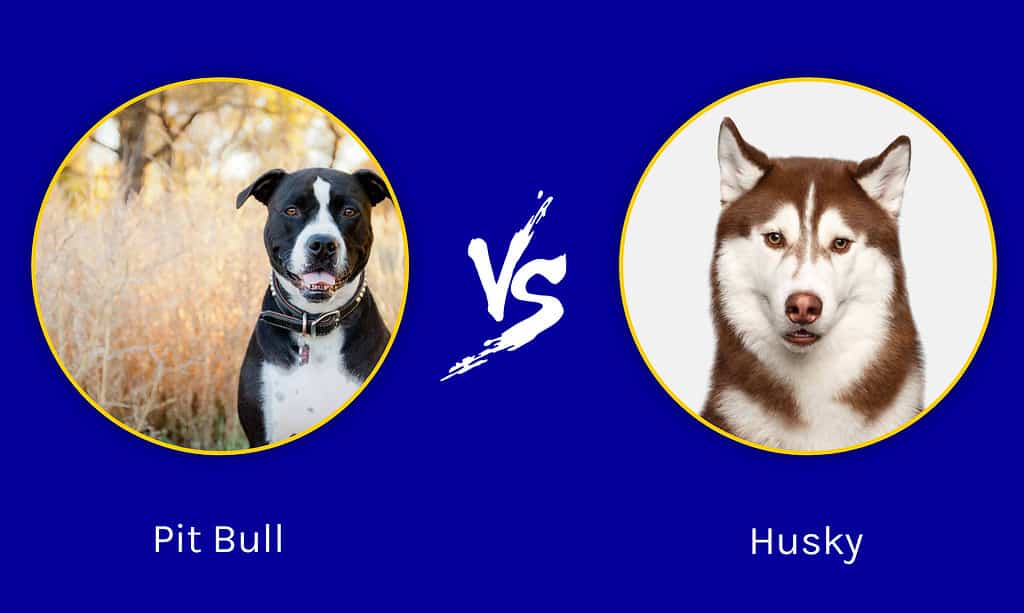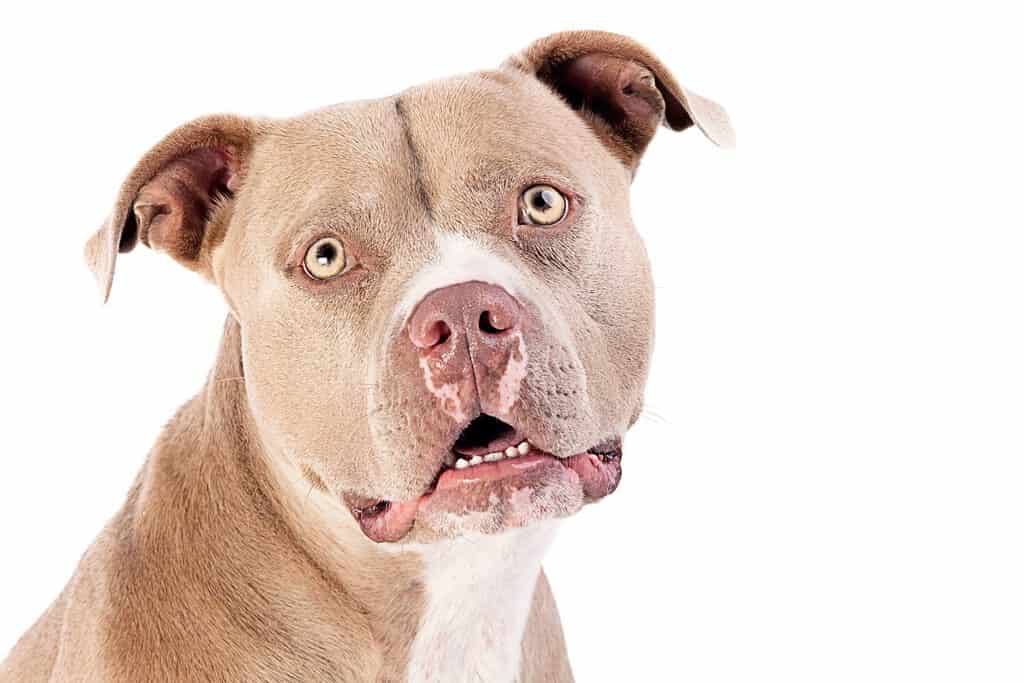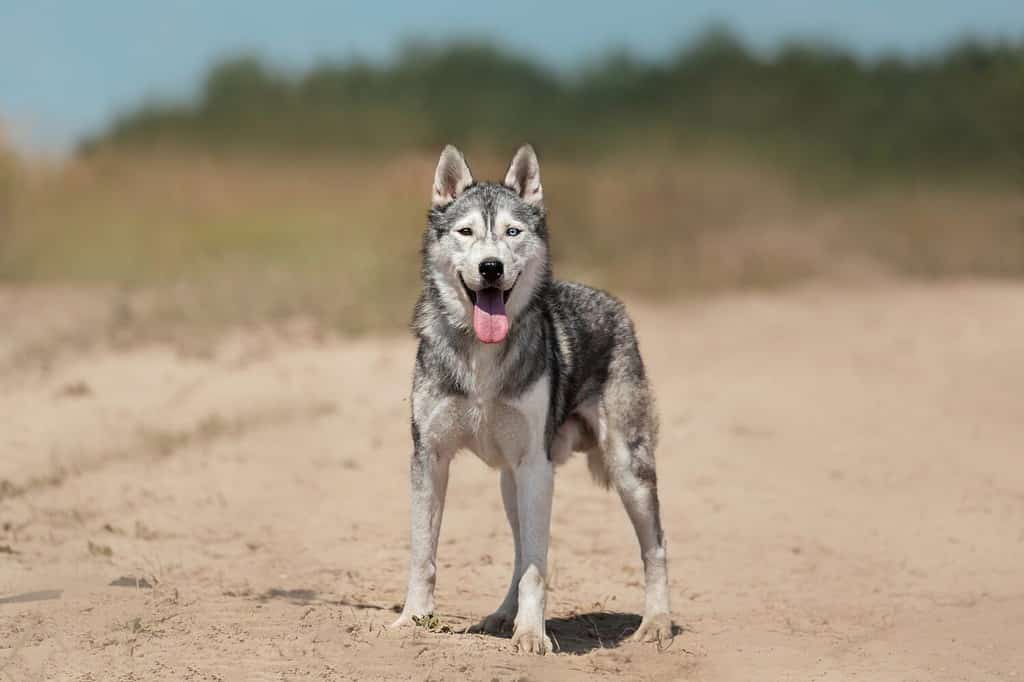Whether you need a confident, smart companion or a mischievous, outgoing sidekick, there is the perfect dog breed for everyone. Obviously, every dog, no matter the breed, needs a good home. But choosing the right dog that fits your family’s needs and lifestyle can be a tough decision. But armed with the proper information, you can make the decision process a little easier. Check out this pit bull vs. husky comparison and learn how they differ in appearance, personality, and daily needs.
Pit Bull Vs. Husky: A Comparison
| Comparison | Pit Bull | Husky |
|---|---|---|
| Height | 17 to 19 inches | 20 to 23.5 inches |
| Weight | 40 to 70 pounds | 35 and 60 pounds |
| Coat Type | Short, smooth, single layer | Thick, medium-length, double coat |
| Shedding | Low to moderate | Heavy |
| Drooling | Low | Low |
| Colors | Black, white, brown, blue, red, brindle | White, black, gray, red, and brown |
| Temperament | Confident, courageous, smart | Attentive, energetic, and mischievous |
| Barking | Moderate | Heavy |
| Energy and Social Needs | Moderately playful with well-balanced energy and mental needs | Extremely playful, very high energy, and needs lots of mental stimulation |
| Training | Moderately difficult | Moderately difficult |
| Life Expectancy | 12 to 16 years | 12 to 14 years |
The Key Differences Between a Pit Bull and a Husky

The four key differences between the pit bull and the husky are appearance, personality, grooming requirements, and energy needs. Apart from their general appearance being different, huskies and pit bulls require different needs and lifestyles. Huskies are more energetic and playful and require more exercise and mental stimulation than pit bulls. And pit bulls are easier to groom and don’t shed as much. Let’s uncover their differences further.
Appearance
Pit Bull Vs. Husky: Height and Weight
Despite its common reference, pit bulls are not actually a breed. “Pit bull” is a general term used to describe several breeds, most of which belong to the terrier group. The American Staffordshire terrier is the only pit bull recognized by the American Kennel Club. On average, pit bulls range between 17 and 19 inches tall and weigh 40 to 70 pounds, depending on the gender. These dogs are strong and muscular with a boxy shape.
Huskies are working dogs, meaning they were bred for a special job, such as pulling sleds. This breed measures 20 to 23.5 inches tall and weighs between 35 and 60 pounds. They are medium-sized dogs with powerful and compact bodies meant for endurance.

Pit bulls have short, smooth coats with a single layer.
©Anaredif/Shutterstock.com
Pit Bull Vs. Husky: Coat Type and Colors
Pit bulls have short, smooth, single layers of hair. So while they shed and blow their coats twice a year, there is less hair overall than dogs with double coats. Pit bulls are low to moderate shedders and only require grooming about once a month. Just a simple bath and brush is all they need. These dogs also don’t drool very often. And they come in many colors, such as black, white, brown, blue, red, and brindle.
The husky has a thick, medium-length double coat. Its undercoat is dense and wavy, while its topcoat is thick and straight. This extra protection guards them against harsh winters and can even reflect heat during the summer. Due to their double coat, huskies are heavy shedders and require weekly to monthly grooming. Thankfully, they are not heavy droolers. Huskies can be white, black, gray, red, and brown.
Characteristics
Pit Bull Vs. Husky: Temperament and Social Needs
While pit bulls can vary depending on their exact breed mix, most are confident, courageous, and smart. These dogs often get a bad rap for being aggressive, but when trained and raised properly, they make excellent family pets. Pit bulls are very affectionate and love to cuddle, and they do best with older children. They also need to be socialized around other dogs early on in their training. These dogs are relatively open to strangers but are very protective of their owners and territory. And while they like to play, they are also fine with relaxing on the couch with their favorite people. Overall, pit bulls have well-balanced energy and mental needs. But they are slightly stubborn and can be more difficult to train.
Huskies are attentive, energetic, and mischievous. If you want a dog that absolutely loves and adores everyone it meets, then the husky is the dog for you. This breed is extremely loving, excellent with children, does well with other dogs, and is very open to strangers. They also play nonstop, are highly adaptable, and have an endless amount of energy. But they are not good as guard dogs and don’t care too much about protecting anything. Be forewarned, huskies need lots of exercise, activities, and mental stimulation. And they can also be difficult to train.

Huskies are extremely playful and energetic
©Tatianasoba/Shutterstock.com
Health Factors
Pit Bull Vs. Husky: Life Expectancy and Health Problems
Pit bulls and huskies have comparable lifespans. Pit bulls live an average of 12 to 16 years, while huskies live 12 to 14 years. However, both breeds can easily extend their average lifespan with proper diet, exercise, and vet visits.
Here are some common health problems to look for in pit bulls: hip dysplasia, obesity, skin problems, knee problems, thyroid disease, and heart disease.
Huskies are prone to cancer, heart disease, hip dysplasia, eye disease, hypothyroidism, and autoimmune skin disease.
The photo featured at the top of this post is ©
Ready to discover the top 10 cutest dog breeds in the entire world?
How about the fastest dogs, the largest dogs and those that are -- quite frankly -- just the kindest dogs on the planet? Each day, AZ Animals sends out lists just like this to our thousands of email subscribers. And the best part? It's FREE. Join today by entering your email below.
Thank you for reading! Have some feedback for us? Contact the AZ Animals editorial team.






